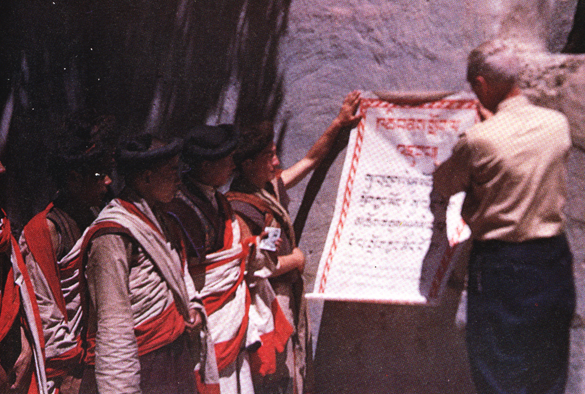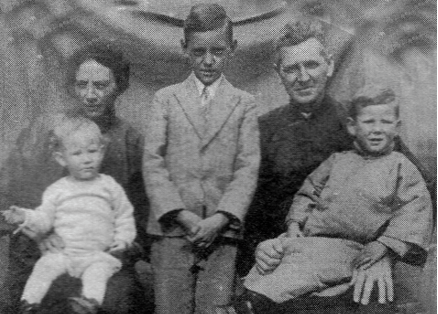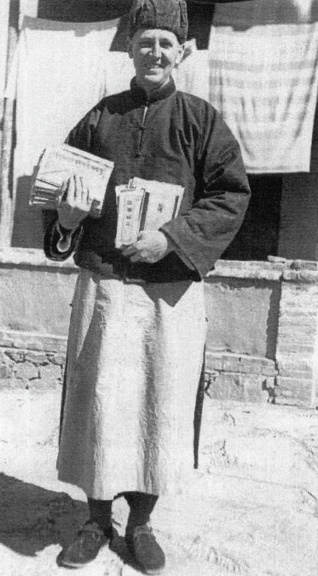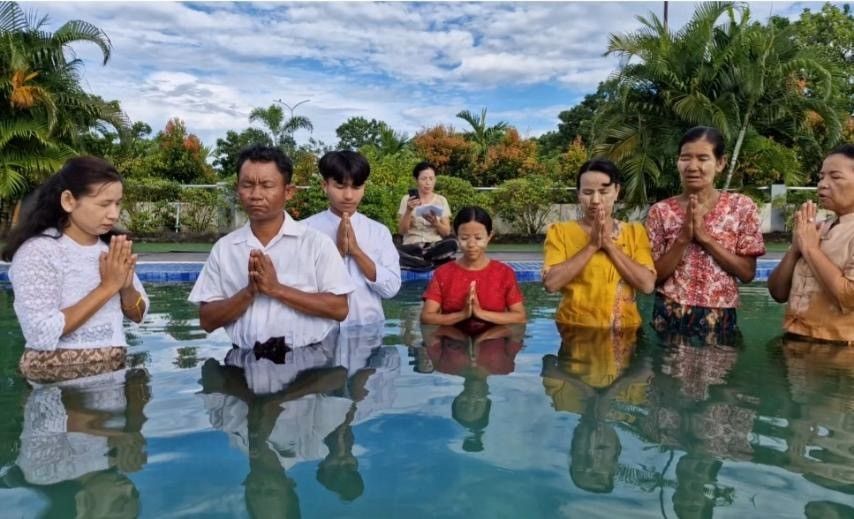M. G. & Blanche Griebenow
Amdo ཨ་མདོ་

M. G. Griebenow sharing the gospel with Bon monks at Labrang.
In 1921, Marion Grant Griebenow—a "tall, gangly farm boy" from Minnesota who preferred to be called by his initials M. G.—and his fiancé Blanche, a native of Delaware, sailed for the Orient on separate ships one month apart, as it was the policy of the Christian and Missionary Alliance that engaged workers not spend time together until they were married. The new recruits "promised that they would go, study the Tibetan language diligently, and make no plans for marriage until after they had passed two examinations in that language."[i]
M. G. had first heard God's call to Tibet when the veteran missionary William Christie visited Crown College, where Griebenow was studying. Christie didn't sugar-coat the challenges anyone wishing to reach Tibet would face, and told the class that "Each time he stood in the open marketplace and distributed pamphlets in the Tibetan language, the monks, who alone were literate, read them and immediately tore them to shreds, shouting angrily. They chased him down the road, stoned him, and ordered him never to return!"[ii]
Christie's challenging message kindled a fire in the young man's heart, and he consecrated his life more fully to Christ, promising he would willingly go to the most backward and difficult mission field if God desired.
M. G. learned all he could about Tibet, but found that no other students shared his interest. His classmates were being trained to reach American youth, and many found it strange that a young man with such potential would "waste" it in a dark, little-known corner of the world.
M. G. and Blanche were finally married at Choni, and became the first missionaries granted permission to live at Labrang (now known as Xiahe in Chinese). As they studied the Amdo language with the help of a local monk named Aki Dgom Chok, they were reading part of the Bible aloud when their teacher suddenly exclaimed, "That's it! That's it!" He had just read Jesus' promise that He would never leave nor forsake His children but would be with them to the very end of the age. The missionaries were confused about his reaction and asked for an explanation. The monk made a startling confession:
"Many of us were afraid that you were getting too popular in Labrang. People were visiting you and inviting you to their homes, even the nomads for miles around. They came to you when they were sick, and you made them well. When they had problems, you helped them. When you preached, they listened.
Maybe you would cause trouble, so the sorcerers decided to gather in the temple and chant curses on you. We kept it up day and night. But when we sent someone to see the results, nothing had happened to you. He reported that you were up at the open market, preaching to a crowd of Tibetans, and your wife was visiting some women in the town. The house had not burned down, and the horses in the courtyard seemed to be fine. In fact, nothing had been disturbed.
We decided that more sorcerers were needed, and we sent a messenger to bring them from another area to help us with the chanting. Again we kept at it for many days and nights, but with no results. We could not understand it. We knew those demons. We could call them by name right up from the ground! That was the very first time they had ever failed us. When people hired us to put a curse on their enemies, we called up demons to kill their animals, and whole herds were wiped out. Even the people grew sick and died....
Now I know why our curses never worked on you. You are protected by a great power that we did not know about. Apparently, demons cannot prevail against the Creator of heaven and earth!"[iii]

M. G. and Blanche Griebenow with three of their sons who were raised with Tibetans
The Griebenows established strong relationships with the leaders of Labrang, and they became close friends with Apa Alo, the head of the most prominent Amdo family in Labrang.
A large part of the Griebenow family's success and longevity in the Tibetan stronghold was their humble attitude and ability to mingle with the local Tibetans in a way that few Western missionaries have been able to achieve either before or since. Their oldest son, George, provided insights into the extent to which he had integrated into the local community:
"I enjoyed growing up there and I trusted these kids and they trusted me. There were no cultural or racial prejudices. It was all I could do to compete with them on horseback and firing a rifle and getting along with them. The Tibetan children were very charming, very lively, full of games, full of fun, full of mischief, very optimistic.... They were athletic, acrobatic, very good at gymnastics, but above all the Tibetans had a great sense of humor. They loved practical jokes, and unless you could give and take in the field of practical jokes and story-telling and narrative, you were not very well accepted.
I remember being very well accepted and being able to compete at the level of the Tibetans, and they no more thought of me as an invader or a person with a Christian religion.... I spoke their language and dressed like they did, I accepted them and they accepted me....
The Tibetan people won my open admiration and I did not consider them in any way inferior or superior to myself as human beings. I was born there, I grew up with them, I saw them have children, I suffered with them, and I enjoyed them."[iv]

M. G. distributing gospel literature on the streets of Labrang.
The Tibetans had grown to love and respect the Griebenow family to such an extent that, on one occasion, after the couple had provided medical treatment to a badly injured bandit and nursed him back to health, the man asked M. G. to become his "blood brother." This would involve the two men drawing and mixing their blood, thus binding themselves for life. The bandit told the missionary that if he should be killed in an upcoming battle, "My wife will become your wife, my parents your parents, and my sheep, oxen, yaks—everything will become yours."[v]
M. G. took the opportunity to share the gospel powerfully with his Tibetan friend, explaining another blood covenant that the Son of God had made with the human race. The man withdrew from the battle and reportedly was persuaded that he didn't need to offer of his wife and possessions to keep his close friendship with M. G.
The common assumption was that M. G. and the bandit had not proceeded with the blood covenant, but decades later, Griebenow's daughter Lois revealed:
"The Tibetans' loyalty was just as intense as their ferocity. After dad helped a bandit leader back to health after a near-fatal stabbing, the bandit sliced open his finger and mixed blood with the man who saved his life. Dad was then considered a blood-brother for life. Years later, dad's party was ambushed by this very bandit pack. He called out the name of his blood brother and the attack was called off."[vi]
The Griebenows continued their outreach among the Amdo throughout the 1930s and 1940s, until their long service came to an abrupt end when they were forced to flee before the advancing Communist army in 1949, after 27 years in Labrang. By that time the Griebenows had been joined at Labrang by Wayne Persons and Mac Sawyers and their wives, and the departure of the whole team was a severe blow to the gospel in the area.
M. G. and Blanche became missionaries in Jerusalem for a time, and were then stationed in Hong Kong. For years they petitioned the Indian government for permission to live in north India among the Tibetan refugees, but their applications were continually rejected and they never again worked among the people they loved so dearly.

© This article is an extract from Paul Hattaway's book ‘Tibet: The Roof of the World’. You can order this or any of The China Chronicles books and e-books from our online bookstore
[i] Blanche Griebenow, Called to Tibet: The Story of M. G. and Blanche Griebenow (West Conshohocken, PA: Infinity Publishing, 2009), p. 10.
[ii] Griebenow, Called to Tibet: The Story of M. G. and Blanche Griebenow, p. 6.
[iii] Griebenow, Called to Tibet: The Story of M. G. and Blanche Griebenow, pp. 134-35.
[iv] Neitupski, Labrang, pp. 59-61.
[v] Neitupski, Labrang, p. 61.
[vi] Lois Kemerer, cited in Neitupski, Labrang, pp. 61-62.




